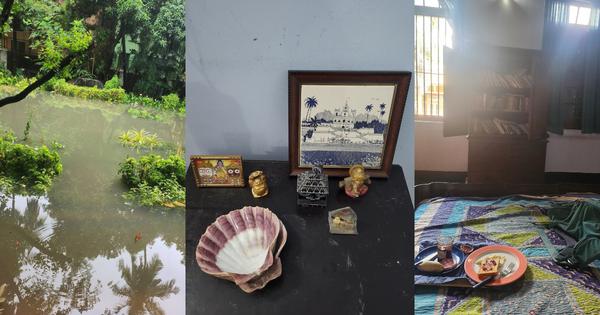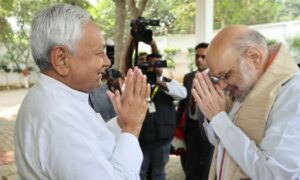
Thunderstorms crashed outside, and because of a cloudburst, our garden looked like a pond. Two live fish had entered my bedroom, a first in all my years of existence. The floor was waterlogged, the walls damp, the space unlivable. I carried what I could upstairs to my grandmother’s room, a room I had not stepped into in two years, ever since she passed away.
The air was heavy with dust and silence. The room smelled of old paper and disuse, of memories sealed away. On the shelves were the objects that had always surrounded her: jars of guava jelly, carefully labelled in her neat script; the gods arranged in quiet rows, Ganesh, Saraswati, Lakshmi; a laughing Buddha; and, incongruously, a Mario Miranda sketch I had once brought her from Goa. Every object was a story, a reminder of her meticulous care. She preserved not only recipes and rituals, but moments, laughter, principles, acts of generosity so subtle they could be mistaken for habit.
I remembered how she would call me in from downstairs, asking me to stay longer: Ektu ekhane bowsh. Stay a little while more. Our conversations tethered us across generations. Yet her last words to me were both tender and insistent: I want to see a naat jamai. I had laughed at the time, masking the ache inside me, and told her I doubted anyone could love me as I needed to be loved. For her, a good marriage was still the horizon she wished for me. That desire seemed to define her role as grandmother, as woman, as matriarch.
Reading Taslima
I remembered one occasion that captured her humour and subversiveness. In Bengal, we have the ritual of aiburobhaat, a celebration before a young woman’s marriage. With no groom in sight, I had once convinced her to throw me a grand birthday party, inviting all our extended relatives, letting it become my replacement aiburobhaat. Some relatives were amused, some astounded, but Boo acquiesced with her characteristic quiet generosity, smiling as if to say, you may bend tradition, but not the heart behind it.
Over the years, I had glimpsed her subversiveness: the quiet indulgence of my minor rebellions, the playful bending of tradition, like the pseudo-aiburobhaat party. Boo had always been a subtle co-conspirator, smiling at the ways I nudged against expectation, never stopping me but never openly endorsing it either. So when I discovered Taslima Nasrin tucked away between Sarat Chandra Chattopadhyay and Rabindranath Tagore on her shelves, it felt less like a shock than the logical culmination of a nature I had already begun to sense.
On her bookshelf, behind the visible rows of Sarat Chandra and Rabindranath, I found something that unsettled all my assumptions: Nasrin’s Nirbachita Column. The book did not enjoy pride of place, but nor was it hidden. Its cover was worn, the spine softened from handling, the pages slightly dog-eared. In places, her neat script underlined a passage, a small mark of attention that made the hidden author feel almost intimate, a companion in the quiet corners of her life.
It was like stumbling upon a secret door in a house I thought I knew. Here was a woman who outwardly urged me toward tradition, who valued respectability, who wanted the security of a husband for her granddaughter. Yet here, too, was evidence that she had spent time with Nasrin, a writer vilified in her own land, censured for her boldness, exiled for her words. My grandmother, who outwardly embodied tradition and duty, had quietly left traces of intellectual rebellion for me to find.
Nasrin once wrote:
“মেয়েরা যারা লেখে, সাধারণের মধ্যে তাদের ধারণা আছে যে তারা লিখছে, নিশ্চয়ই তাদের জীবনে বড় কোনো দুর্ঘটনা ঘটছে।”
“Women who write are often assumed, in ordinary life, to be experiencing some great upheaval as they write.”
I chose this quote because it mirrored my own experiences: the act of writing itself is treated as scandalous, bold, disruptive.
Another quote struck me for its unabashed and pointed critique of gendered expectations:
“প্রেমে পড়া অথবা প্রেমে ব্যর্থ হওয়া, সংসারে অসন্তোষ অথবা সংসার বৈরাগ্য ইত্যাদি ব্যাপারগুলো না ঘটলে একটি মেয়ে ওজথা সাহিত্য রচনা কেন করবে তা অনেকের বোধগম্য নয়।”
“If a woman has not fallen in love or failed in love, if she has not experienced dissatisfaction in marriage or detachment from domestic life, many cannot understand why she would write literature at all.”
I included this passage because it exposed the ways women’s lives are policed, not only in action but in perception. A woman is expected to live a certain narrative, and any deviation, literary or intellectual, is assumed to emerge only from extraordinary trauma. Finding this in my grandmother’s room reframed inheritance for me: she had left a coded lesson that women’s interiority, curiosity, and questioning can persist silently, unjudged, even across generations.
Nasrin’s unflinching gaze on social hypocrisy reached a fevered critique in another passage, which my grandmother had read carefully:
“প্রস্টেট-এর পরিবর্তন এবং প্রতিকার আমার বিষয় নয়, আমার বিষয় প্রস্টেট হঠাৎ রোগগ্রস্ত হওয়ায় ষাট-সত্তর বছর বয়সে সেইসব বুড়ো পুরুষ যারা কামোদীপনা বৃদ্ধি পায়, বিয়ে করবার জন্য অস্থির হয়ে ওঠে। অনেকে এই বিয়েকে ন্যায্যসঙ্গত করার জন্য নানা রকম যুক্তি তৈরি করেন। যেমন, বুড়ো বয়সে যত্ন করার কেউ নেই অথবা আমাদের রসুলুল্লাহ নবী উদাহরণ দিয়ে গেছেন ইত্যাদি। শারীরিক অসুস্থতার কারণে যৌন উদ্দীপনা বৃদ্ধি পায়, তাই তারা কোনো বয়সী মহিলা নয়, কিশোরী থেকে যুবতী পর্যন্ত মেয়েদের বিয়ে করার আগ্রহ প্রকাশ করে।”
“The transformation and remedy of aged men is not my concern. My concern is that, due to sudden illness, men in their sixties and seventies become restless with heightened sexual desire and seek to marry. Many try to justify such marriages with various arguments, for example, that in old age there is no one to care for them, or that our Prophet has given examples. Due to physical weakness, sexual desire can increase, so they express interest in marrying not adult women of their own age but girls ranging from adolescents to young women.”
I included this quote because it underlines the systemic pressures women face: society condones and even encourages violations of women’s autonomy when it suits men, while women’s interior lives must remain invisible.
Ruptures and inheritance
Scholar Veena Das captures this duality as well: “The everyday world for women is constructed by forces that regulate what is permissible to experience, what must remain silent, and what can be inherited across generations.” Her insight echoes the lesson my grandmother left for me through her hidden reading and subtle acts of rebellion: the visible life is only part of the story; the interior, the silent, the unspoken, is where inheritance and resistance reside.
Inheritance, then, is not only about continuity but also rupture. It is the jewellery and the recipes, but also the hidden book, the unspoken thought, the refusal lodged silently between approved texts. By stumbling on Nasrin’s Nirbachita Column, I inherited not just my grandmother’s absence but also her complexity, her quiet resistance, her unarticulated questions. The aiburobhaat, her laughter, her subversive generosity, and her hidden reading all intersected to teach me that living fully sometimes requires negotiating the visible and invisible worlds.
Outside, the rain poured without pause. Inside, the room was full of ghosts, her laughter, her persistence, her contradictions. Grief surged like the floodwaters pressing against the house. And she had left me something precious, even if she never intended me to find it.
In the end, grief is love with no place to go.* But perhaps, through the books we leave behind, through the silences and the rebellions that seep through, love does find a place. It lingers in discovery, in recognition, in inheritance reframed. And so, in that storm, I carried her forward, not just as grandmother, but as a woman who read, resisted, and lived more expansively than she let on.
* Cited by Alan D Wolfelt, who writes on morning, in Healing After Loss: Daily Meditations for Working Through Grief.
Reeti Roy is a writer and cultural commentator whose work consistently delves into the intersections of memory, art, identity, and politics. She holds a degree in English Literature from Jadavpur University and a Master’s degree in Social Anthropology from the London School of Economics and Political Science (LSE). Roy’s writings have been widely published across platforms, including The Wire, The Quint, Outlook India, MargASIA, and Newslaundry, where she bridges critical journalism, cultural critique, political frameworks, and creative enterprise.
📰 Crime Today News is proudly sponsored by DRYFRUIT & CO – A Brand by eFabby Global LLC
Design & Developed by Yes Mom Hosting






